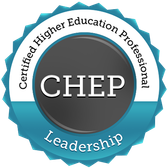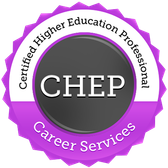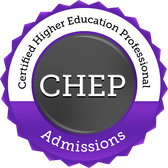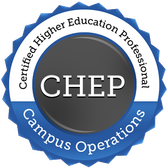Badge Evidence | Completed Courses (4 Hours Each)
ACCSC101Fulfilling the Standards of Accreditation: Administration
This course "pulls back the curtain" for schools to help them better understand the principles and purposes of the ACCSC Standards of Accreditation. ACCSC101, along with the accompanying course ACCSC102, lays out the standards in line with the way schools are typically structured to better help you comprehend the important relationship between each standard and each aspect of running a compliant, accredited school. This course addresses the standards on the administrative side of your school, such as standards that relate to operations, admissions, and financial aid.
AD105Communication Essentials
Effective communication skills are essential in every aspect of life - especially in our work with students. This course provides a foundational understanding of all forms of communication and offers new techniques to improve admissions performance. In addition, a communication hierarchy provides participants with an advanced understanding of rapport building and connecting with today's students.
AD106RPowerful Telephone Techniques
Whether your admissions personnel work exclusively by telephone or use the phone for setting a face-to-face appointment, they need a tool kit of powerful telephone techniques to be successful in working with students. This course provides best practices for both inbound and outbound calls. Admissions professionals learn how to project professionalism and a positive attitude in their telephone personality and identify methods for conducting effective and appropriate calls.
AD107RConnecting with Today's Students and Each Other
Success in helping students begins with "connecting" in a meaningful way. These connections are formed through our ability to understand generational experiences and preferences in communication. Additionally, a better understanding of ourselves helps us connect with students. This course explores how to work better together by using common collaborative principles and improving teamwork.
AD113Managing Your Attitude and Energy to Maximize Your Effectiveness
The most successful admissions professionals are those who maintain a positive attitude and energy, but maintaining that positivity each and every day can be tough. This course focuses on the importance of understanding and building your personal attitude and energy to maximize your effectiveness. You will have the opportunity to assess your attitude and energy and manage these elements to maximize your performance. In this course, we will examine the fundamentals of attitude and energy and understand why they are so important to your success. In addition, we will utilize assessments to look at your current attitude and energy levels. Finally, we will review tips and best practices to enhance your energy and attitude output. Once you have completed the course and activities, you will be prepared and ready to best serve your students and school by maximizing your personal attitude and energy.
AD114Adapting Your Communication for Successful Connections
Today's admissions professionals need expanded methods to adapt to where the prospective student is in the decision-making process. Whether you work with students online, face-to-face, or a little of both, adding variety will help you successfully connect with your students. In this course, you will discover ways to improve your connections with prospective students, best practices for inbound and outbound communication, how to address challenges in the moment, and methods for effective follow-up that improve your effectiveness as an admissions professional.
AD115Effective Questioning and Listening
Questioning and listening are essential elements of communication - especially when working with students. This course provides an in-depth understanding of the purpose of skillful listening, and how this is necessary to be the most effective in your position. In addition, this course provides an in-depth understanding of the purpose and types of meaningful questions. You'll be introduced to the fundamentals of both questioning and listening, as well as new tools and techniques to help you refine your questioning and listening skills.
CM102Raising the Bar - Compliant Communications with Students
This course is designed for employees of all roles and levels at institutions that participate in federal financial aid programs. The course provides an awareness of prohibited acts which could adversely impact operations, and covers the requirements which must be adhered to in order to maintain good standing with state* and federal regulations as outlined in the Program Integrity rules. Emphasis is on areas of misrepresentation related to advertising and recruitment activities, interactions with prospective students and appropriate communication of disclosures and other publications.
*This course currently covers the regulations for the following states: AZ, CA, CO, FL, GA, IL, IN, KS, LA, MA, MI, MN, MO, MS, NC, NM, OH, OK, OR, PA, SC, TN, TX, VA, WA. Course participants can select specific state(s) at the beginning of the course to customize the training content to their state.
CM140Title IX and VAWA Training: Building Safer Campuses
This course is designed to assist personnel at all levels of an educational institution in the understanding of the provisions of Title IX of the Education Amendments of 1972 ("Title IX") as amended on August 1, 2024, and the Clery Act as amended in the Violence Against Women Reauthorization Act of 2013 ("VAWA"). These laws require that all individuals in an educational institution understand and comply with the laws in terms of what is prohibited behavior in relation to sex-based harassment and/or sexual violence, and what steps are to be followed when such prohibited conduct occurs. This course gives the participants information about the laws, as well as procedures to follow, to provide for the rights of all individuals under the laws. It also provides additional resources to assist educational institutions in continuing to build and strengthen their Title IX and VAWA policies, procedures and training throughout the year.
CM141FERPA and Privacy: A Practical Approach
The Family Educational Rights and Privacy Act of 1974 (FERPA or the Buckley Amendment) is a federal law in the United States designed to provide students with access to, and the privacy of, their educational records. The law applies to students in higher education and educational institutions that receive funding under a program administered by the U.S. Department of Education. This course is designed to provide participants with a working knowledge of FERPA guidelines to ensure proper handling of educational records and other institutional requirements.
CM251Students with Disabilities: Legal Obligations and Opportunities
This course provides faculty, staff, and administrators with an understanding of the legal mandates regarding equal access for students with disability. More importantly, it provides a practical framework to help institutional personnel know what to say and do in the context of their defined role and interactions with students with disabilities. Topics include the civil rights nature of applicable Federal law, definitional issues, the impact of disability on traditional education activities and pursuits, reasonable accommodations, and the unique responsibilities of faculty, staff, and administrators as prescribed by their position.
CS107Advising Students on Using Digital Career-Marketing Strategies
In today's world where jobs are posted online, matching algorithms screen digital résumés, and recruiters source candidates online, students must market themselves online. Writing a résumé and cover letter alone is no longer an adequate skill set for career seekers to successfully find and secure employment as well as manage, advance, and transition their career throughout life. Students must know how to digitally market themselves, and 21st century career advisors must know how to advise them. This course will help you advise students on developing digital career-marketing strategies for career success.
CS112Advising Students on Developing Modern Job Search Documents
In the most competitive economy ever, crafting powerful job search documents, communicating strategically with employers, and presenting evidence of one’s qualifications won’t even necessarily get candidates jobs—it’ll barely get them interviews. This course covers advanced writing techniques, shows examples, and offers detailed strategy explanations to help career professionals enhance their ability to teach students how to craft modern job search documents and strategic employer communications. You'll be able to more effectively advise students on how to use impactful strategies that differentiate them from competitors through résumés, letters, portfolio evidence, and strategic post-interview correspondence.
*This course also contains several downloadable resources to be used in your career center.
CS117Teaching Professional Networking Skills for Career Success
Professional networking is an essential career development skill that can lead to new job opportunities, higher salaries, and valuable relationships. Despite the numerous advantages of networking, many learners are unaware of its importance and not equipped with the knowledge and skills needed to effectively build and maintain professional relationships. Career professionals must be able to teach learners how to build the social capital they need to gain access to opportunities, information, and resources that drive career success.
This course provides a structured, practical approach to helping learners develop the knowledge and skills needed to foster professional relationships that will assist in career advancement for years to come.
*The course contains multiple done-for-you resources for download and use with learners.
CS120Interviewing 101
Help students ace the interview with successful tactics to showcase their qualities and make them the best fit for the job. A career management specialist will be able to master the appropriate actions for students to take before, during, and after the interview. These tactics can then be implemented in a career management class or during the preparations for prospective job interviews. The goal of this course is to help develop a better understanding of the topic and produce tangible resources to help implement plans, strategies, and ideas at your school. In addition to lecture videos, resource links, and assessments, you will be able to utilize Journal and Learning Activities, which will continue to be useful after successful completion of the course.
CS122Teaching LinkedIn Strategies for Career Success
In today's digital labor market, a strong online presence is a necessity. As the world's largest online professional network, LinkedIn is a critical platform for anyone serious about building their professional online presence and advancing their career. However, many learners may not know how to make the most of this powerful tool, and as a career professional, it's your job to help them succeed. This course will equip you with the knowledge and skills you need to teach your learners how to create a standout LinkedIn profile, expand their professional network, and tap into valuable resources that can help them stay ahead in their field.
*The course contains multiple done-for-you tools and resources for download and use with learners.
CS125Working Effectively in Remote Environments
Remote work has been on the rise for decades and is now shaping the way companies everywhere do business. To work effectively in remote environments, you must learn new skills, tools, and mindsets that enable you to communicate, collaborate, and connect with colleagues you may never physically meet.
This course will teach anyone considering or currently working in a remote position how to boost their productivity, balance work-life demands, and build meaningful professional relationships regardless of place, proximity, or time zone. With the knowledge and skills developed in this course, you'll be better equipped to thrive, or help others to thrive, in remote work settings.
FA120Default Prevention: A State of Mind
This course offers proven-successful techniques that ultimately prevent student loan delinquencies and defaults. Because there is not one miracle that reduces the chance of student loan defaults, this compilation of ideas and practices collectively greatly reduces those risks by giving ownership of the loan responsibilities to the students who benefit from them. By integrating effective borrower education and interaction from the day your students walk through your front door, your students will embrace the state of mind needed to give them lifetime accountability for their Federal Student Loans obligations.
FA230Financial Aid Management - Compliance without Compromise
With a seemingly endless stream of new laws and regulations, institutions have become burdened with ensuring they are compliant, while continuing to give great customer service to their students and families and all while achieving larger institutional goals. The role of the Financial Aid Office in compliance cannot be underestimated, but the Director of Financial Aid cannot ensure compliance in a vacuum.
This course is designed to examine the fundamentals of law and regulation, and of the enforcement process. More importantly, this course provides tools for School Directors, Chief Financial Officers, Enrollment Managers, and Financial Aid staff to develop and build compliant practices that don't interfere with effective operations, customer service or institutional goals.
FA231Regulatory Compliance - Outside the Financial Aid Office
This course will help participants to interpret the many rules and regulations that are required by educational institutions offering Title IV funding. It will aid in preparing management and faculty in recognizing that compliance is the responsibility of the entire institution and is not just the job of the Financial Aid Office. Course content will also aid the individual in building a "culture of compliance" which will encourage teamwork and secure the cooperation of others on campus.
LS101RDo You Manage Or Lead?
This course explores the critical differences between management and leadership. Participants will be introduced to definitions and myths about each area as well as how management and leadership must coexist for an organization to operate effectively. Participants will explore their own management/leadership tendencies through exercises to see leadership and management in action.
LS102How Do You Lead?
Not everyone is suited for, or desires, a leadership position. One of the first steps to being an effective leader is to understand the desire to lead in the first place. Participants will explore their motivation to lead and develop a deeper understanding of their leader style(s).
LS103RYour Leadership Impact
To improve your impact and effectiveness as a leader, you must not only understand the role of a leader, but you must also take into consideration the followers and the situation. This course defines leadership impact and explores the interactional framework for leadership.
LS104RYour Leadership Legacy
The higher education industry provides a wealth of opportunities and challenges for those seeking leadership positions. In this course, participants will gain a deeper understanding of the higher education sector and themselves. The importance of higher education institutions will be explored along with developing a personal leadership legacy.
LS105RYour Leadership Toolkit
Get ready to add a number of skills to your toolkit as you develop as a leader! This course focuses on increased self-awareness in communication styles and learning; developing deeper understanding through empathic listening; and motivating through innovation.
LS106This Way to Leadership
This course provides you with a framework to put your self-discovery and learning into a workable plan to further develop your leadership skills. A step-by-step process is offered to help you create a meaningful Personal Leadership Development Plan (PLDP) complete with the development of SMART Goals and advice from some of today's leaders in the higher education sector.
ML134Career Management
In this course, you will learn how to manage your career - including how to identify your business interests, professional values, and skills in order to target your most exciting career possibilities.
ML135Time Management
This course will help you master effective time management techniques. You will learn to analyze how you currently spend your time and pinpoint opportunities for improvement. The course will show you how to plan your time efficiently using scheduling tools, control time-wasters, and evaluate your schedule once it is underway.
OP106Developing New Programs: Research and Selection
Educational institutions need to be aware of emerging employment opportunities in new and expanding fields if they are going to continue to attract students. Most licensing and accrediting agencies ask an institution for some form of feasibility study when submitting new program-add applications. The research involved in this step often requires proof of need for the program, number of anticipated job openings, and input from employers. This course outlines ways to collect data to make an effective decision and show regulatory agencies proof of employment opportunities. Step-by-step directions are included to assist institution staff in conducting effective research and preparation of curriculum to meet employer specifications.
OP115RHiring the Right Faculty for Your Institution
This course shows you how to hire high-quality instructors and orient them to your institution. The skills also apply to hiring staff. It's easy to hire someone to do a job. But it can be difficult to hire the right person. You want instructors who are top notch. They represent your institution and interact with the most people at your campus and particularly your students. This course starts with how to determine exactly what type of people you need as your instructors. Then it shows you how to recruit and hire them. Once hired, you'll learn how to introduce them to the working environment at your institution. By the time you finish this course, you'll be recruiting, hiring, and orienting quality instructors. You'll see results in improved enrollments, student achievement, retention, and completion.
OP121Managing Online Faculty at a Distance
It is no longer news that predictive learning analytics are changing online classroom instruction. This course teaches current trends in locating, hiring, monitoring and retaining the best professionals that specialize in online instruction. More importantly, this course provides insights for using the new predictive analytic approaches to optimize management of online faculty. Generalized "best practices" are waning in favor of real-time monitoring for individualized qualitative and quantitative analyses. This real-time approach provides significantly increased student success and retention. Also addressed in the course is how to build a strong faculty management team, continuing faculty development recommendations and various business considerations.




















































